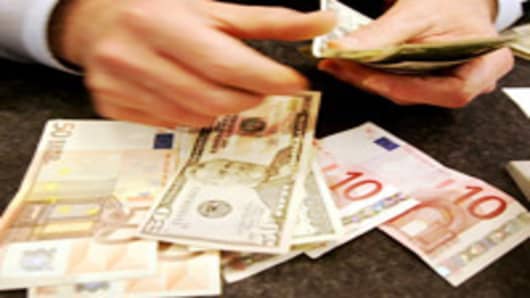The dollar rose against the euro and yen Wednesday, moving further from Tuesday's record low against the euro, on positive earnings news from Wells Fargo and lower oil prices.
The dollar extended gains after Federal Reserve Chairman Ben Bernanke told a House of Representatives panel that currency intervention may be warranted under certain conditions.
"Bernake's no fool, he's been handed a terrible deck of cards and he's in a very rough spot right now," said Firas Askari, head of FX trading at BMO Capital Markets in Toronto.
But Askari emphasized most of the dollar gains on Wednesday were on softer oil prices, adding he thinks they are short-lived.
"At the end of the day, I think you look to pick up some euros down at these levels," Askari said.
Midway through the New York session, the euro was down against the dollar, having pulled back from the record high hit the previous day.
The dollar was up versus the yen after earlier hitting its lowest since late May. Lower crude prices drove the dollar higher against the yen.
U.S. crude futures fell, after data showed U.S. stocks of crude oil and refined products rose last week.
"Oil should get crushed here on the unexpected inventory increases. Lower oil is dollar-supportive if recent correlations hold, which they seem to be doing," said a trader at Forex.com in Bedminster, New Jersey But it was Wells Fargo which set the dollar up for gains on the day after news that the fifth-largest U.S. bank also raised its dividend despite a 23 percent decline in profit caused by bad loans.
The earnings report, which came just as the New York session began, raised optimism for some stability in the U.S. financial system.
Investor attention remains focused on the U.S. financial sector, analysts say, particularly after the U.S. government was forced to come up with a rescue plan for mortgage finance giants Fannie Mae and Freddie Mac, just as one of the country's biggest mortgage banks, IndyMac, collapsed.
Bernanke told a House of Representatives panel on Wednesday his top priority is restoring U.S. financial calm even as weak growth and inflation threaten the economy, in prepared comments mirroring ones he made a day earlier to a Senate committee.
Later comments he made that currency market intervention may be justified under certain conditions, even if rarely, added to the dollar's allure on the day.
"Market intervention is a policy that's been undertaken a few times," said Bernanke.
"I think it's something that should be done only rarely, but there be may be conditions in which markets are disorderly where some temporary action may be justified. But I think the dollar in the long term depends really on the fundamentals and it's up to us to get the fundamentals right."
Investors had a mixed reaction to a larger-than-expected jump in U.S consumer prices for June, the largest rise since September 2005, given that it increased uncertainty about the outlook for higher U.S. interest rates even as the economy slows.
While higher rates raise the attractiveness of dollar-denominated securities and stoke demand for the dollars to buy them, they would also choke economic growth at a time when investors worldwide are concerned that the U.S. economy could still fall into a recession.
After an early raft of U.S. economic releases, investor attention now turns to the release of the minutes of the Fed's June monetary policy meeting.
Elsewhere the Australian dollar slipped from a 25-year high after comments from Reserve Bank of Australia Governor Glenn Stevens were perceived as indicating Australian interest rates had probably peaked.
The Australian dollar fell against the dollar .


